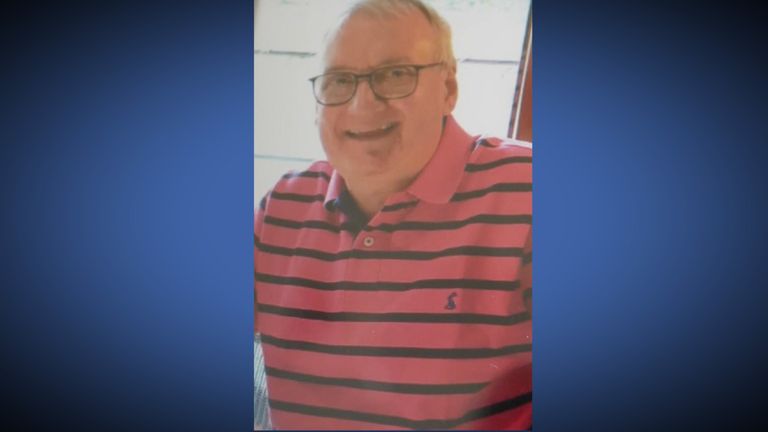The family of an NHS pharmacist who took his own life after suffering paralysing complications from a COVID jab are calling for urgent reform of the government’s compensation scheme for vaccine damage.
John Cross was told by the official medical assessor for the scheme that the jab had caused his rare neurological effects, but that he wasn’t disabled enough for a payment.
Mr Cross was unable to move, blink or breathe after his first dose of the vaccine.
He spent seven months recovering in hospital but was left with chronic pain and numbness – and suffered several relapses.
After he was rejected by the Vaccine Damage Payment Scheme (VDPS), his mental health deteriorated and he took his own life.
Speaking exclusively to Sky News, Philip Cross, John’s youngest son, said the family would seek to overturn the judgment and force reform of the VDPS.
“We want some good out of this and to get the system changed in memory of dad.
“You look at everything and it’s just wrong. It’s unjust.”
John was a staunch supporter of vaccination, eager to get his COVID jab to protect elderly relatives and help end the pandemic.
But two weeks later, he suffered rapidly progressive paralysis that swept up his body.
He was admitted to intensive care where he was given a tracheostomy, a breathing tube in his neck. And nursing staff had to tape his eyes closed so he could sleep.
He slowly learned to eat, walk and talk again. But he never regained the mobility and fitness he had enjoyed before his illness.
Doctors eventually diagnosed Chronic Inflammatory Demyelinating Polyneuropathy, nerve swelling that leads to a loss of strength or sensation.
Adam, John’s eldest son, said his father dreaded intensive dialysis-like treatment to remove rogue antibodies from his blood because it left him severely fatigued for days.
“I think he knew that without the treatment, this long-term condition would yo-yo, possibly for the rest of his life,” he said.
“And he’d have to deal with that. It’s devastating.”
John was urged by his doctors to submit a claim to the VDPS.
The scheme was set up in 1979 to make a one-off payment of £120,000 to people who have suffered rare, but significant, side effects to a range of vaccines.
But after a two-year delay, with only a review of his medical records and no face-to-face assessment, his claim was rejected.
His widow, Christine, said: “Nobody spoke to him. There was no personal contact, nothing. Just fill in this form and that was it.
“I’m very angry. John went through enough with the illness and the recovery without going through the trauma of this bureaucracy.”
John began gathering medical evidence to have the judgment overturned.
But he became increasingly anxious and overwhelmed.
In October 2023, faced with more gruelling treatment for another flare-up, he took his own life.
Liz Whitehead, his daughter, said: “We’ve all had our vaccinations. And we continue to since we’ve lost dad.
“But now you start to question. If a rare, unusual thing were to take place, the system’s not got your back. It’s not there for you… is it worth the risk?”
Vaccination has long been seen as a social contract, with individuals taking the jab for the good of everyone.
But all vaccines have rare side effects, and the VDPS was designed to be a safety net for severe cases.
Under the VDPS, a medical examiner assesses patient records and testimony from doctors involved in the claimant’s care.
To qualify for payment, they must be deemed to be 60% disabled, a threshold with origins in compensation schemes for industrial injuries. Amputation below the knee would be sufficient for a payout.
But the Cross family’s solicitor, Peter Todd, of Scott-Moncrieff & Associates, said medical assessors struggle to make “apples and pears” comparisons with complex vaccine damage.
“The threshold is often misunderstood as being very high, akin to being totally paralysed,” he said.
“But it isn’t. It’s a much lower standard, and they have to take into account both the physical disablement and the psychological impact.”
Mr Todd has tracked applications to the VDPS.
Before the pandemic there were a few dozen a year.
But since the COVID vaccine rollout, 14,000 people have made claims, according to Freedom of Information requests submitted by Mr Todd to the NHS Business Services Authority.
Just over 6,000 have so far been notified of an outcome, with 180 people told they would be given a payment.
Another 350 people have been told that on the balance of probabilities the vaccine caused their complications, but that they didn’t meet the 60% disability threshold.
Mr Todd said people can struggle to explain the full impact of their vaccine damage on a complex form.
“There’s a real mismatch between what the claimant has understood about their condition and what the assessor is prepared to accept based purely on medical records that weren’t created for the purposes of this assessment,” he said.
“They rejected (John’s claim) in the most high-handed and unfair manner, which just broke him psychologically.”
The NHS Business Services Authority told Sky News that it did not comment on individual cases, but that it was in touch with the Cross family about their concerns over John’s assessment.
The Department of Health, which is responsible for the scheme, said the ongoing COVID Inquiry would investigate reform of the VDPS as part of its vaccination module starting in January next year.
In a statement, it said: “Assessments of VDPS claims are undertaken by qualified independent medical assessors, who use the medical records and information provided by the claimants’ healthcare providers to make their assessment.”
The Cross family are upset by the slow progress of the case.
“He was our dad, he was a really wonderful man,” said Liz.
“It’s a tragedy and the government needs to hear it. Don’t send me your condolences, don’t tell me how bad you feel for me or us.
“Do something.”
